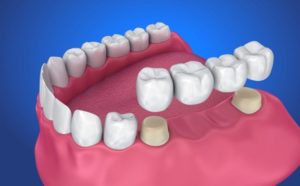
When it comes to replacing missing teeth, dental bridges are among the most effective solutions available! These handy little devices are able to easily restore two or three lost teeth in a row; however, no solution is truly permanent. Even with optimal care, bridges typically last for 10 or 15 years before they need to be replaced, and there are many things that can trigger premature dental bridge failure. Keep reading to learn more!
What Causes Dental Bridge Failure?
As great as bridges are, there are still a few things that can cause them to fail early, including:
- Poor oral hygiene – An unclean mouth will often result in all sorts of oral health issues that can compromise your bridge, including tooth decay, gum disease, and more.
- Bad oral habits – Biting into hard food or objects, clenching and grinding your teeth, and smoking are all poor habits that can be hazardous for your bridge.
- Inadequate support – Your bridge can’t function properly without adequate support from your jawbone; dental implants are sometimes needed to facilitate this.
- Cheap materials – If your bridge is made of cheap materials, it’s much more susceptible to failure compared to a high-quality bridge.
- Skipping dental visits – Your bridge still needs professional care, just like your natural teeth. Your dentist can clean them and check their integrity.
When Should I Visit My Dentist If My Bridge Is Failing?
You should contact your dentist if you notice any of the following warning signs concerning your bridge:
- Tooth or gum sensitivity near your bridge.
- Chips, cracks, or other noticeable damage to your bridge.
- Pain when biting, chewing, or cleaning around your bridge.
- The bridge feels loose.
Can I Prevent Dental Bridge Failure?
Fortunately, you can prolong the lifespan of your dental bridge with excellent oral hygiene. You’ll need to brush your teeth twice a day for two minutes each time, and dentists also recommend using a special flossing tool that effectively cleans the gaps between the gums and your bridge. You should also consider rinsing daily with an antibacterial mouthwash—this helps almost as much as brushing and flossing!
Of course, visiting your dentist regularly is also crucial; not only are they able to thoroughly clean your smile and inspect your bridge for irregularities, but they’re also a fantastic resource for additional information about how to care for your bridge. Even though dental bridges are meant to replace your missing teeth, they can still fail if you aren’t diligent—and you don’t want to have to replace your replacement!
Knowing what expedites bridge failure and taking steps to prevent it will ensure that your bridge can do its job. That said, if you suspect your bridge is failing, contact your dentist to get it the care it needs.
About the Author
Dr. Aliana Henkin received her dental degree from the Rutgers School of Dental Medicine and has proudly served patients in the Springfield, NJ community for several years! Her practice is thrilled to offer a wide range of services including dental bridges. If you have any questions about the article, you can contact Dr. Henkin through her website or over the phone for assistance: (973) 949-0925.
